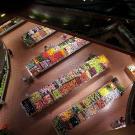
Academics, Chefs and Advocates Reflect on the Roots of Our Food Systems
With flavor and flair, a community of academics, chefs and food justice advocates are sparking conversation at UC Davis and beyond through the new seminar Thinking Food at the Intersections: Justice and Critical Food Studies.
The discussions and workshops kicked off with a Mezcal tasting in November and, for the fall quarter, culminate in a two-day colloquium paired with chef demonstrations, meals and tastings. This is the first of three colloquiums that will continue, along with other events peppered in, through the winter and spring quarter.
“In today’s foodie era, food has become a global cultural obsession, yet our food systems are challenged by deep issues that perpetuate hunger, inequity and environmental destruction. In the face of this stark contradiction, we see a pressing need to question the narratives we construct around food.” — Daniela Gutiérrez Flores, Assistant Professor of Spanish
“Our seminar seeks to create a space where we rethink our collective relationship to what and how we eat," added Gutiérrez Flores, lead principal investigator of the seminar.
The seminar series is supported by a $225,000 grant from the Andrew W. Mellon Foundation received earlier this year. Specifically, the project received an award via the John E. Sawyer Seminar on the Comparative Study of Cultures. The events in the series are free and open to the public.
The fall seminar, “Reimagining the Past through Food Justice,” focuses on how historical perspectives can inform our approaches to contemporary issues of food inequity and injustice.
“Food’s past is riddled with painful stories — our task in this colloquium is to face them, narrate them and even plate those that have been left untold,” said Elizabeth McQueen, postdoctoral fellow at UC Davis. “Food has the promise of connection and commensality as well, so we look forward to sharing meals, learning, and being nourished together.”
Plating and tasting history
Fabiola Santiago stood at the front of Robert Mondavi Institute for Wine and Food Science’s Sensory Theater with a presentation behind her and three bottles full of Mezcal on the table in front of her.
Mezcal, an alcohol made from the agave plant, is experiencing a global boom in popularity but, as Santiago described, that doesn’t mean the traditional knowledge keepers of Mezcal, mostly Oaxacans, are reaping the benefits. Oaxaca, one of Mexico’s poorest states, is home to a large Indigenous population, yet many still see limited returns from the Mezcal industry's success.

"Oaxaca faces a destructive wave of gentrification and cultural appropriation, with food and drink at the center of this trend,” Flores said at the opening of the seminar. “Once scorned for their Indigenous roots, many traditional foods and drinks are now fashionable and profitable. As we enjoy this Mezcal, let's sip mindfully, recognizing how we, as consumers, can either perpetuate or challenge these dynamics."
Though many aspects of the industry and consumption trends are concerning, Santiago highlighted the rich cultural heritage of the agave plant. While attendees enjoyed samplings of ethically produced Mezcal paired with traditional Oaxacan snacks such as chapulines (grasshoppers) and cooked agave, Santiago demonstrated how to identify a high-quality traditional Mezcal using all five senses and spoke about the communal and traditional roles of Mezcal in Indigenous communities.
The enlightening discussion went beyond what goes into making Mezcal and reflected on something those living in Northern California may not have given a second to: the origin, use, production and cultural significance of Mezcal. Santiago explained the agave plant is not only used to produce liquor but also serves as a source of medicine, food and even construction material.
Santiago, executive director and president of Mi Oaxaca, an organization working to preserve Oaxaca’s Indigenous culture, returns to UC Davis in December as one of the colloquium panelists.
Upcoming panels include:
- Food Networks: Extraction, Expansion, Exchange (Marcy Norton, UPenn; Shantel George, University of Glasgow; Andrés Reséndez, UC Davis)
- Food Justice and the Future of Food Histories (Paul Freedman, Yale University; Jeffrey Pilcher, University of Toronto; Enrique Ochoa, Cal State LA)
- Narrating Food’s Past: Diaspora, Immigration and Globalization (Martin Draluck, chef; Fabiola Santiago, Mezcal educator and activist; Ebony Bailey, filmmaker)
- Reclaiming History in the Kitchen (Cooking demonstration, chefs Saqib Keval and Norma Listman)
Chef Martin Draluck of Black Pot Supper Club will be serving lunch on day one amidst a discussion on plating and speculating historical foods.
Draluck was featured on Thinking Food at the Intersections’ first installment of Esculent, a podcast that explores the concept of edibility. In episode one, Draluck and Elizabeth McQueen, a postdoctoral fellow at UC Davis, taste whiskey from the first black-owned whiskey distillery in the U.S while they discuss Draluck’s Black Pot Supper Club, hearth cooking, and involvement in the Netflix docuseries High on the Hog: How African American Cuisine Transformed America.
The upcoming colloquium scheduled for Dec. 6 – 7 has sold out but a waitlist is available.
Thinking through the past, present and future of food
The theme for the winter colloquium, which will be held in March, is “Reclaiming Our Food Narratives as a Social Justice Practice.” The spring colloquium, scheduled for May, will be “Imagining and Enacting Just Food Futures.”
Future events affiliated with the seminar include author discussions, book launches, performances and workshops.
An exhibit of cookbooks spanning five centuries is currently on display at Shields Library through March 21. The exhibit, “Cooking Against the Grain,” includes titles such as Julia Child’s famous Mastering the Art of French Cooking and Our Last Meals?: San Quentin Death Row Cookbook.
For more information on events and news related to Thinking Food at the Intersections, visit the seminar’s website or sign-up for the newsletter.
YOU MAY ALSO LIKE THESE STORIES

The Unseen Step Between Farm and Table
In her short film Unpacking Immigration, anthropology doctoral candidate Harleen Bal illuminates what she calls the “unseen middle step between the farm and the table” by exploring the lives of immigrant meatpackers living in Livingston, California.

UC Davis Scholar Explains the Importance of Chiles in Birria
Assistant Professor Gutiérrez Flores, who specializes in early modern Spanish and colonial Latin American studies, talks about birria tacos on KQED's "Beyond the Menu." The episode also features the owners of El Garage in Richmond, Calif. and food writer Bill Esparza as host Cecilia Phillips explores the foods origins.
